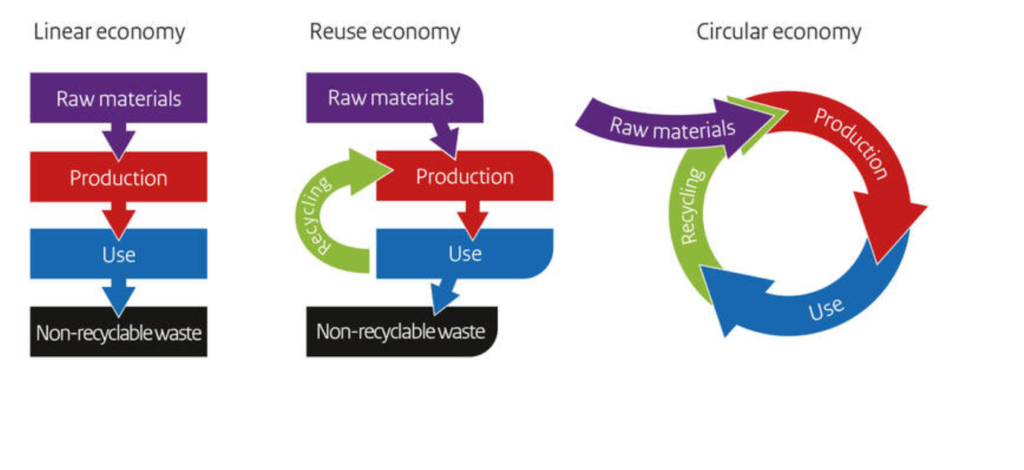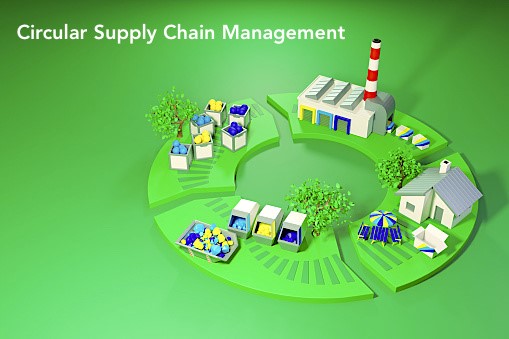
The Circular Economy
Taking the fastest route towards your destination is often the most effective one as you will use the least time possible. However, is it also the most efficient? This is a completely different question. Your efficiency depends on how you determine your efficiency factor. Is your idea of efficiency to spend the least amount of money on fuel? To take the route in the most sustainable way possible? To see the most beautiful scenery along the way? If your idea of efficiency is one of these mentioned, your strategy of taking the fastest route is probably not a good idea. This concept of efficiency is crucial for businesses to understand as it allows them to optimize their operational activities and business model.
Businesses often conduct their operations as streamlined as possible with the integration of supply chain tools, omni logistics, e-commerce practices, and sustainable processes. To improve payment processing, customer service, logistics management, and to have a strong supply chain, it will take strong commitment and focus. Let’s take an average supply chain from a start-up.
Supply Chain Processes and the Circular Economy
Understanding the processes used by businesses of all sizes is critical for supply chain operations today. Everything from logistics company names to reputation and internal processes need to be considered.
First, the sought-after raw materials are procured. Then, the business uses these raw materials and labor to convert them into their final product. Lastly, this product is sold, and any waste material is disposed of.
This Linear way of conducting business is often how many start-ups begin their journey as it seems practical and straightforward. Depending on your business model/goals, there might be an alternative way to conduct business that yields benefits such as increased resource utilization, labor force efficiency, and sustainability within your business model.
The circular economy is a term used within Business practices that primarily aims to reinforce sustainability within business elements (Ministerie van Infrastructuur en Waterstaat, 2019). It is a great piece of the subscription management solution and customer subscription management. It is a foundational process.
The fundamental pillars of a circular economy are made of the term reusability. Instead of disposing of waste, waste materials are used through methods such as recycling, aiming to give purpose to waste.
During the end-to-end creation of glass but can be utilized more effectively. This residue is melted in a circular economy to create new glass. It is a circular process that feeds from one into the other and saves time, money, resources, and labor..

Integration of Subscription Management Solutions and Omni Logistics
There are many Supply Chain elements where the Circular Economy concept can be integrated. These elements include the following.
- Product design
Fundamentally altering product design can yield strong sustainability benefits. This is often best done when releasing/starting a new product, as big changes could take time to implement on scale. Sustainable packaging and product labelling is a way to integrate the Circular Supply Chain concept. The razor blade company ‘Boldking’ for instance gives their customers discounts on future products when sending back their packaging. The used packaging is later converted into new razor blade packages.
- Procurement
Raw materials that are technically restorative or intrinsically reusable have a low negative environmental impact thus increasing sustainability within Supply Chains. The concept of acquiring such materials is often called ‘Green Procurement’.
These materials increase the utilization rate and decrease waste generation. Examples are glass and paper as mentioned earlier and there are many other examples of subscription management solutions and sustainable processes that are in high demand today.
- Production
Sustainable manufacturing practices are a great way to maintain a Circular Supply Chain. Although green production hasn’t been widely used (mostly due to cost-benefit compared to cheap labor), it certainly yields strong benefits when implemented correctly.
Producing using renewable energy sources such as Solar Power reinforces an autonomous production process. It is also a key component of omni logistics and supply chain operations.
- Logistics
Sustainably distributing products can be achieved through route optimization and avoiding concepts such as same-day delivery. It is important to be aware of your current logistical process. Consulting experts on the best way to distribute your products or manage your internal logistical process can be extremely beneficial as professional expertise can guide (in)experienced businesses in the right direction.
- Consumption
Consumption is an interesting way to apply Circular Supply Chain Management as it has not been used until recently. It is predominantly gaining traction within the mobile phone industry where unwanted phones are returned to the respective company in return for discounts on newer models. Since new phones are often released on an annual basis, this is a great way for companies to regain their resources.
- Waste Management
Waste management is essentially reusing waste material for your production process. To take the prior example, the unwanted and returned phones (waste) are not disposed of but instead taken apart carefully. Individual elements such as the processing unit, battery, Glass, metal frame, are all given a new purpose by reusing them in the new production process.
- Supply Chain Technology
The newest addition to integrating a Circular Supply Chain into a business is done through Sustainable Technology. This concept hasn’t been adopted on a wide scale as much technology is relatively new, however, some companies see the benefits gained from certain technology.
TTechniques and concepts such as IoT (Internet of Things) and omni logistics can yield substantial benefits when adopted correctly. If there is no inside knowledge on these concepts, it is strongly advised to seek professional expertise.
Bringing Circulate Economy Trends Together With Supply Chain Management
Circular Supply Chain Management (CSCM), integrates the philosophy of the circular economy into supply chain management. This creates a new and compelling perspective on the supply chain sustainability domain (Farooque et al., 2019).
Need professional advice on the right way to integrate circular supply chain management and sustainable subscription management solutions? Contact one of ModusLink’s Industry experts to get started!
Bibliography:
Angelis, D. R. (2018). [PDF] Supply chain management and the circular economy: towards the circular supply chain | Semantic Scholar. Semanticscholar.Org. https://www.semanticscholar.org/paper/Supply-chain-management-and-the-circular-economy%3A-Angelis-Howard/68c441507594095a7f07af8018c844194b88fa84
Farooque, M., Zhang, A., Thurer, M., Qu, T., & Huisingh, D. (2019, April 1). Circular supply chain management: A definition and structured literature review. ResearchGate. https://www.researchgate.net/publication/332690616_Circular_supply_chain_management_A_definition_and_structured_literature_review
Ministerie van Infrastructuur en Waterstaat. (2019, March 26). From a linear to a circular economy. Circular Economy | Government.Nl. https://www.government.nl/topics/circular-economy/from-a-linear-to-a-circular-economy
Supply chain management in the era of circular economy: the moderating effect of big data | Emerald Insight. (2020, September 3). Emerald.Com. https://www.emerald.com/insight/content/doi/10.1108/IJLM-03-2020-0119/full/html